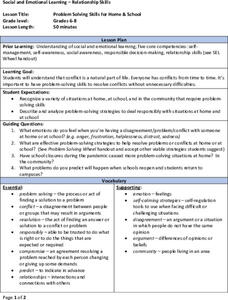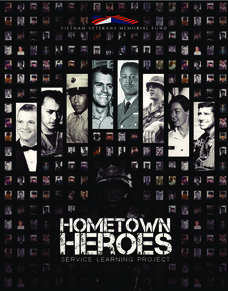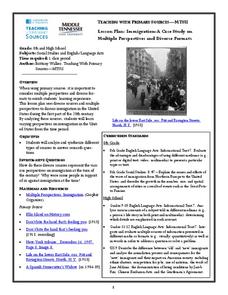Facing History and Ourselves
Decision-Making: Introduction to the Unit
Make your classroom a supportive and communicative place to be before beginning a unit on the Holocaust. Working together as a class, learners reflect on their previous experiences of classroom discussions before establishing a...
Curated OER
Artists Teach Us to See the World through Visual Symbols
Tenth graders analyze a biographical piece of art by Raymond Saunders. They identify shapes, symbols, and lines that are used, and how the piece relates to the artist's life and modern society. They design and create an original piece of...
Curated OER
Developing Dialogue
Why do people argue? Use the article "A Holiday Medley, Off Key" to discuss the struggles that interfaith couples face when choosing to celebrate certain holidays. Then, in small groups, encourage learners to write dialogues that...
Visa
Privacy Please: Protecting Your Identity
What are the different ways we are susceptible to identity theft? Impress the importance of protecting personal information and privacy with this resource, which includes an excellent video clip, discussion prompts, and worksheets for...
Close Up Foundation
Teach the Vote
Why is voting important? A social studies unit presents a non-partisan approach to the importance of voting, to voting laws and procedures, and to resources that voters need to become informed voters.
Facing History and Ourselves
When Differences Matter
Jane Elliott's controversial blue eyes/brown eyes experiment detailed in the film A Class Divided leads to a discussion of privilege, social power, and opportunity. Viewers note how the children react to the experiment, share their...
Facing History and Ourselves
Responding to Difference
James Berry's poem, "What Do We Do With a Difference?" launches a lesson that asks class members to consider the ways people respond when they encounter someone different from themselves. After analyzing the poem and discussing how they...
Teaching Tolerance
Understanding the Prison Label
Break the chain. An engaging lesson examines why it is so hard to break free of the prison system in the US. Academics participate in a reader's theater, read primary sources, and discuss their thoughts. The lesson explains the hardships...
Curated OER
Quotation Response Speech: Public Speaking Skills
Improve high schoolers' public speaking with an engaging activity. Class members select three personally relevant quotes from a list. They then write a short speech for each quote, explaining how the quotes are personally relevant. The...
Education Foundation of Sarasota County
Problem Solving Skills for Home and School
Dr. Seuss' The Zax has a lesson to teach tweens and teens about the importance of problem-solving skills. After viewing the short video, groups identify conflicts that may occur at home, in school or in the community. They then...
University of California
Equal Rights? The Women's Movement from Suffrage to Schlafly
If you've never heard of the Equal Rights Amendment, it's probably because there isn't one in the United States Constitution. Delve into the contentious history behind the ERA, its founders and supporters, and reasons for its political...
Stanford University
Civil Rights or Human Rights?
Young citizens consider the American civil rights movement as part of the global struggle for human rights. After using a timeline activity to learn about the major events in the civil rights movement, class members study Malcolm X's...
Heritage Foundation
Procedural Rights: Amendments VI, VII, and VIII
Even in court, your class members have procedural rights provided by the amendments. Teach high schoolers this important lesson by using the 18th installment of a 20-part unit exploring the US Constitution. The resource provides several...
Council for Economic Education
Satisfaction Please! (Part 3)
Understanding the US government's role proves very important in the American economy, especially for consumers. Scholars learn about how varying government agencies help them when facing an issue. The third and final resource in the...
Annenberg Foundation
Teaching Geography: Workshop 4—North Africa/Southwest Asia
Can Jerusalem be equitably organized? Can Israel and Palestine be successfully partitioned? Part one of a two-part workshop looks at the geo-political history of Jerusalem while Part two investigates Egypt's dependence of the Nile River...
K20 LEARN
But What About Me?: Teaching Perspective In The Social Studies Classroom
How would the story of the discovery of America be different if indigenous people told it through their eyes? Individuals compare the conventional account of this moment in history to an account given by one of the native peoples. After...
Constitutional Rights Foundation
If Men Were Angels: Teaching the Constitution With the Federalist Papers
Much like the methods of group work, the writers of the Federalist Papers worked together to advocate for their viewpoints against the anti-federalists. The resource enables learners to break into small groups and conduct research before...
iCivics
Tribal Government: High School
Did you know there are 567 federally recognized American Indian and Native Alaskan tribes and villages in the United States alone? The resource helps break down the complexities of many different tribal societies to explain the concept...
Vietnam Veterans Memorial Fund
Hometown Heroes
Transform studying about veterans in a textbook to personal interviews with veterans in the community. Four varying lesson plans make up an entire unit or individualized learning based on your class's needs. Exercises include researching...
Scholastic
Dear Miss Breed
This compelling plan based on the letters in the book Dear Miss Breed engages readers in learning what it was like for Japanese Americans following the attacks at Pearl Harbor. After reading the letters, young scholars will partake in...
Curated OER
Topical Discussions
Engaging in topical discussions can be a great way to teach kids how to build strong arguments and support their opinions with concrete evidence. High schoolers choose a controversial topic, build an argument for or against that topic,...
Middle Tennessee State University
Lesson Plan: Immigration: A Case Study on Multiple Perspectives and Diverse Formats
As part of a case study of U.S. immigration during the first part of the 20th century, class members examine a variety of primary sources that present multiple perspectives of the responses of those in favor of immigration and those...
Foreign Policy Research Institute
Teaching the 9/11 Anniversary
Here is a activity on terrorism and 9/11. While outdated, it could be easily revised for today's teens. It includes targeted vocabulary, a background information activity, critical thinking questions, and step-by-step procedures for...
Digital Public Library of America
Teaching Guide: Exploring To Kill a Mockingbird
Harper Lee's To Kill a Mockingbird, considered by many to be a seminal piece of American literature, contains many complex literary themes that carry through United States history. Use a series of discussion questions and classroom...

























